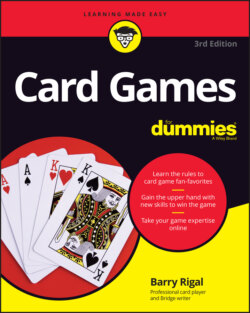Читать книгу Card Games For Dummies - Barry Rigal - Страница 54
Snap
ОглавлениеGet ready for a fast and furious game! Snap is all about mental reaction time, and one of the few games in which luck plays no part at all.
To play Snap, you need the following:
Two or more players. There is no formal upper limit, but if you play with more than six players, the neighbors may complain about the noise.
A standard deck of 52 cards. Play Snap with a single deck of cards if you have fewer than four players; add a second deck if more players compete. Playing this game with a used deck is a good idea — the cards can take a beating (literally).You don’t need a full deck of cards — a card or two can be missing from the deck. You can also play Snap with special cards designed for another game (such as an Old Maid deck), as long as most of the cards have backs identical to other cards in the deck.
The dealer deals out the whole deck of cards face-down, one card at a time to each player, in a clockwise rotation. It doesn’t matter if some players get more cards than others. What does matter, however, is that you don’t look at the cards you get.
Each player, starting with the player to the left of the dealer, takes a turn flipping over the top card of their pile and putting it face-up in front of them. After a few turns, each player has a little pile of face-up cards.
When you turn over all the cards into the pile in front of you, you pick up the pile and use it again without shuffling them.
The flipping process continues until one player turns over a card of the same rank as the top card on another player’s pile. As soon as the matching card is revealed, the first person to call out “Snap!” takes the two piles with matching cards and puts them face down under their own pile.
Frequently, two players make the Snap call simultaneously. In this case, you put the two piles with the same card together, face-up, in middle of the table. Everyone continues to turn over the top cards on their piles until someone turns over a card that matches the card on the pile in the middle of the table. The first person to shout “Snap pool!” wins the middle pile. The new piles that are being created are still up for grabs in the usual way, of course. Whenever a pairing is created, the first to shout “Snap” wins them.
When a player mistakenly calls out “Snap!” their pile goes into the center of the table; the first player to call “Snap pool!” at the relevant moment gets their pile. You have to operate with what you have left, and if you run out of cards, you are out of the game.
The player who ends up with all the cards wins the game.
For some reason, Snap brings out the worst competitive instincts in people, myself included. Establishing several informal rules can avoid Snap-induced bloodshed:
Set rules about the proper way to turn over your card. You can’t turn over the card so that you see it first, which means that you must flip over the card in a continuous, fast motion onto your pile.
Get an impartial witness to decide on all close calls. If you can, choose someone who isn’t playing the game, preferably an authority figure such as an adult.
A devious, cunning player remembers the order of their pile (or of another player’s pile) when the pile gets small so they gain a big edge in the calling. Keep an eye on the cards as the game draws to a close; if you don’t, you put yourself at a disadvantage. If you want to avoid this situation, you can agree to shuffle your pile when you’ve worked your way through it.
You can play a couple of variations to basic Snap to make the game more appropriate for the age range of the players:
In Simplified Snap, which is suitable for three or more players, all the players put the turned-over cards on a single pile in the middle of the table. You call “Snap!” whenever the top card on the pile matches the last card played. This method allows you to focus on only one place.
Speed Snap provides a challenge, which makes it better for older players. All players turn over their cards at the same moment so that the reaction process speeds up. To make sure that all the players turn over their cards simultaneously, the umpire (or one of the players) must say “One, two, three!” with all players turning over the cards on three.
